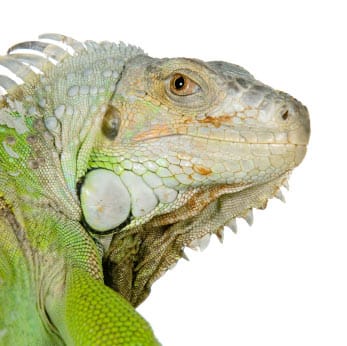Why is my iguana walking around in circles?
Q: My iguana has been walking around in circles to the right. What could this be? Thank you.
A: This is a somewhat unusual clinical sign and one not often seen in iguanas.
Circling – a condition where an animal tends to walk in circles, often accompanied by a head-tilt – is usually a sign of a middle ear problem or damage to specific nerves or the area of the brain that interprets balance and movement. Vestibular disease is one type of problem that may cause circling.
Circling may be caused by trauma; bacterial, fungal or viral infection; tumor growth; parasitic infestation; abscess growth or any number of other medical conditions.
The last case I have seen of an iguana with a head-tilt circling was an iguana that had a substantial rock dropped on his head by mistake. The iguana immediately developed those signs due to the head trauma he suffered. Long after the injuries had healed, the iguana would still circle to the left, but he learned how to eat and get around in spite of his somewhat debilitating traumatic injuries.
Circling can be a sign of many different conditions, so you will need to seek out a qualified herp veterinarian to help you. Your veterinarian will need to perform a physical examination, run some tests and prescribe medication. In some cases, surgery may be needed.
Unfortunately, some conditions that cause circling can result in permanent disability. But, until you take your iguana in to see a herp veterinarian, we won’t know the possible cause, treatment and prognosis for recovery. As I have said, some animals will learn to compensate for whatever caused the head-tilt and circling, and may continue to thrive in spite of this condition as long as the inciting problem is treated successfully.
Need a Herp Vet?
If you are looking for a herp-knowledgeable veterinarian in your area, a good place to start is by checking the list of members on the Association of Reptilian and Amphibian Veterinarian (ARAV) website at www.arav.com. Look for DVMs who appear to maintain actual veterinary offices that you could contact.
Or, check out the state by state ReptileMagazine Vet Listings.



